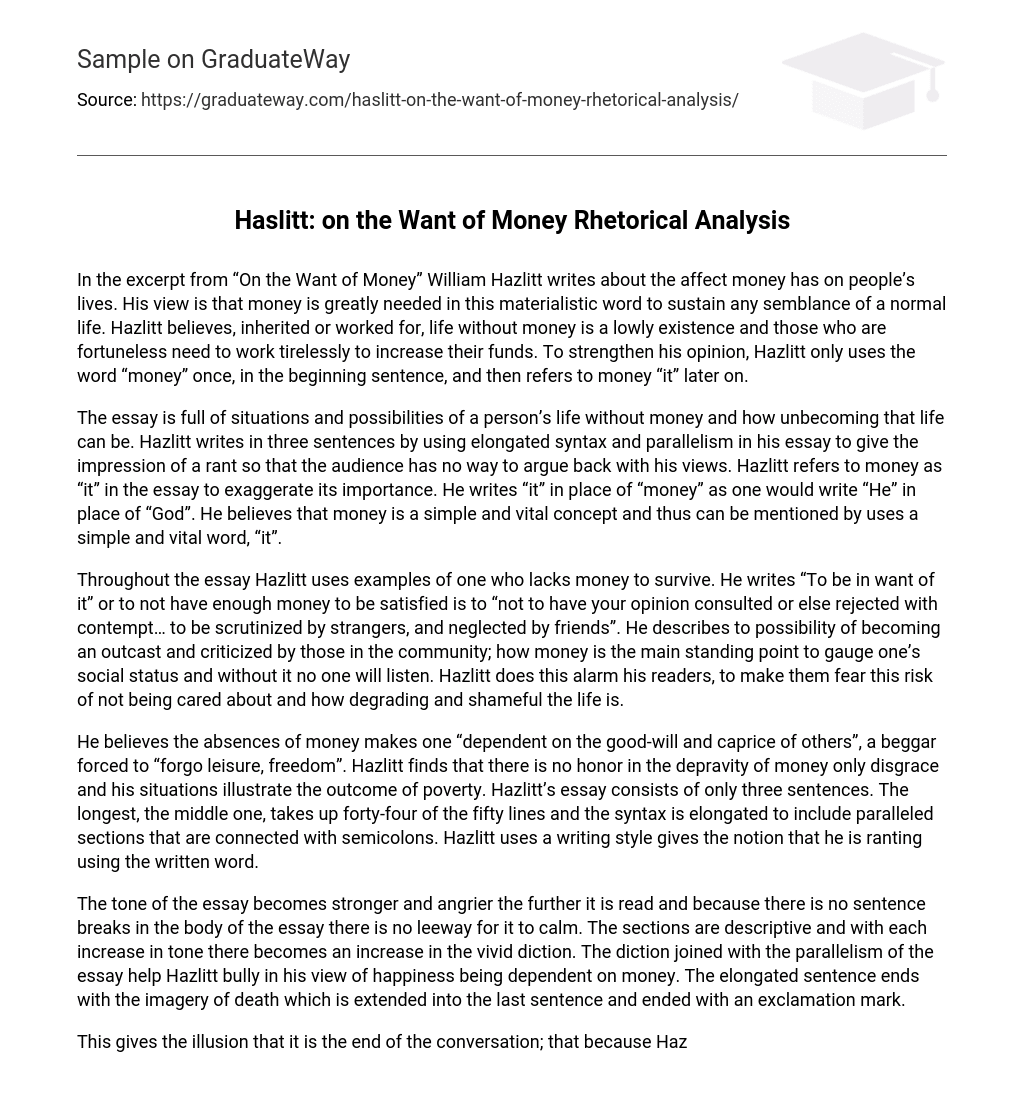In the excerpt from “On the Want of Money” William Hazlitt writes about the affect money has on people’s lives. His view is that money is greatly needed in this materialistic word to sustain any semblance of a normal life. Hazlitt believes, inherited or worked for, life without money is a lowly existence and those who are fortuneless need to work tirelessly to increase their funds. To strengthen his opinion, Hazlitt only uses the word “money” once, in the beginning sentence, and then refers to money “it” later on.
The essay is full of situations and possibilities of a person’s life without money and how unbecoming that life can be. Hazlitt writes in three sentences by using elongated syntax and parallelism in his essay to give the impression of a rant so that the audience has no way to argue back with his views. Hazlitt refers to money as “it” in the essay to exaggerate its importance. He writes “it” in place of “money” as one would write “He” in place of “God”. He believes that money is a simple and vital concept and thus can be mentioned by uses a simple and vital word, “it”.
Throughout the essay Hazlitt uses examples of one who lacks money to survive. He writes “To be in want of it” or to not have enough money to be satisfied is to “not to have your opinion consulted or else rejected with contempt… to be scrutinized by strangers, and neglected by friends”. He describes to possibility of becoming an outcast and criticized by those in the community; how money is the main standing point to gauge one’s social status and without it no one will listen. Hazlitt does this alarm his readers, to make them fear this risk of not being cared about and how degrading and shameful the life is.
He believes the absences of money makes one “dependent on the good-will and caprice of others”, a beggar forced to “forgo leisure, freedom”. Hazlitt finds that there is no honor in the depravity of money only disgrace and his situations illustrate the outcome of poverty. Hazlitt’s essay consists of only three sentences. The longest, the middle one, takes up forty-four of the fifty lines and the syntax is elongated to include paralleled sections that are connected with semicolons. Hazlitt uses a writing style gives the notion that he is ranting using the written word.
The tone of the essay becomes stronger and angrier the further it is read and because there is no sentence breaks in the body of the essay there is no leeway for it to calm. The sections are descriptive and with each increase in tone there becomes an increase in the vivid diction. The diction joined with the parallelism of the essay help Hazlitt bully in his view of happiness being dependent on money. The elongated sentence ends with the imagery of death which is extended into the last sentence and ended with an exclamation mark.
This gives the illusion that it is the end of the conversation; that because Hazlitt finishes with death there can be no rebuttal statement, no disproof of his opinion. Hazlitt believed that there is no happy existence without money. In the excerpt from his essay “On the Want of Money” he uses situations of destitute and poverty to frighten his readers. He rarely refers directly to money and when he does he calls money “it” to show its value. Hazlitt holds strong to his idea and rants on the importance of money to his audience using his stylized syntax.





